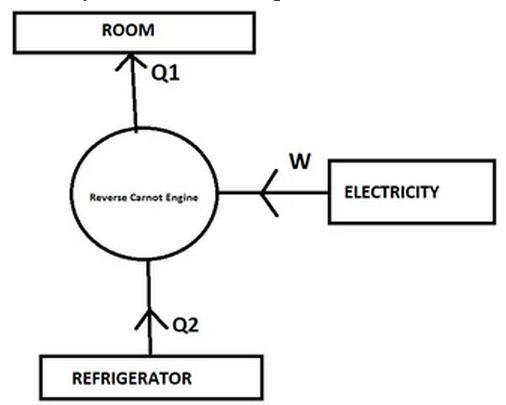Refrigerators
When the door of a refrigerator in a room is kept open, the temperature of the room
This section requires Javascript.
You are seeing this because something didn't load right. We suggest you, (a) try
refreshing the page, (b) enabling javascript if it is disabled on your browser and,
finally, (c)
loading the
non-javascript version of this page
. We're sorry about the hassle.
5 solutions
sorry.could not understand you.
please i can't understand the air inside the refrigerator is cool and when we open its door there will be a thermal contact between the cool gas (inside the refrigerator) and the hot air (outside it) as a resulting the air outside will lose heat so its temperature will decrease so please i need so explanation
Firstly, lets see how a normal refrigerator works (when door is closed): Refrigerators work as heat pumps (but reverse). With the help of a compressor they absorb some heat from inside the refrigerator compartment and reject some amount of heat to the room (via condenser). In other words the heat rejected to room is more than the heat absorbed inside the refrigerator.

Now consider the case when door is open: As the door is open the heat Q 2 is absorbed from the entire room instead of just the refrigerator compartment. While the heat Q 1 is rejected to the room just as before. Q 1 > Q 2 That is, the heat rejected is more than heat absorbed in the room. Hence there is a net heat addition in the room and the temperature of room would increase → We are assuming for the sake of simplicity that: 1 . There are no other energy interactions going on in the room, i.e. no heater, air conditioner or a stove is being operated in the room. 2 . The walls of the room are adiabatic, i.e the outside weather does not affect the room conditions. 3 . The compressor is 100% efficient with no irreversible losses in the form of heat.
The temperature rises because heat is taken from the room and when the same heated is rejected, some further work done by the compressor is also added.So the heat rejected is greater.And then it will take heat from a more hotter room and so the temperature will go on increasing.
The room would get warmer! Think of a refrigerator as a device that transfers heat from inside a box to its surroundings. The room around a refrigerator is warmed as it receives the heat removed from inside the box.
If you leave the door open, heat is merely recycled from the room into the refrigerator, then back into the room. A net room temperature increase would result from the heat of the motor that would be constantly running to move energy around in a circle. It would be like hooking up a water pump to remove water from your basement and routing the discharge tube back to the basement. Inspired by : Paul Walorski,Physics Instructor
Refrigerator is a device which make the heat flow from low temperature region to high temperature region. It extracts the heat from the freezing area to keep it cool and throws the energy out to the atmosphere.
So now the question is whether it takes more energy from the freezing area and throws less energy outside and eat some energy in between,
or
It take less energy from the freezing area and add some of its energy and throws more energy outside.
The correct option is 2nd. To achieve its task it require electricity and eventually that electricity is also converted into heat and thrown out..!! therefore the room will heat up!!
2nd Law of Thermodynamics - This is the perfect solution to this problem.
A fridge can be though of as a "heat pump". It takes air inside the fridge and cools it by removing heat from it. This heat has to go somewhere, though, and is usually blown out the back of the fridge by a little fan. (If you feel the back of a fridge on the outside it will usually be warm if the unit is running).
For this reason, when a fridge is running it is really warming up the room a little bit. In fact, since we can’t design a fridge to be perfectly efficient , some of the electrical energy gets converted to heat, so more heat gets dumped outside the fridge than gets pumped out, so even if you open the fridge door to let the cool air escape the fridge will still be heating the room more than cooling it.
If the name is troubling you then i admit i made a mistake. I was planning to post another problem. Then i thought this was better and so.......
I got the answer from http://van.physics.illinois.edu/qa/listing.php?id=1790